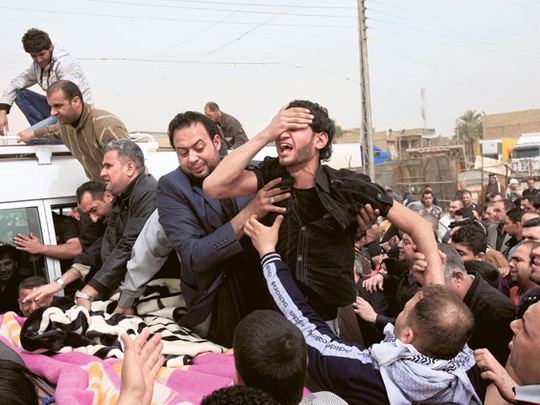
The Arab League summit that opened in Baghdad yesterday is the first since the Arab Spring began in Tunisia more than one year ago, and the first to be hosted by Iraq for more than 20 years. The much-delayed meeting is likely to be dominated by Syria, whose embattled president is not invited. But it may also serve as an unintended showcase for the deep political and religious divisions bedevilling the Arab world.
Iraqi Prime Minister Nouri Al Maliki is said to view the meeting as an opportunity to re-establish Baghdad's regional leadership role after the American military occupation and the isolation of the Saddam years.
But Al Maliki's authority and ambition may be undercut by the bitter, apparently widening schism between Iraq's majority Shiite population, represented by his ruling coalition, and the Sunni minority.
Last week saw a spate of bombings and shootings across eight Iraqi cities that killed more than 50 people. The attacks, claimed by Al Qaida, marked the anniversary of the 2003 invasion but were also seen as a crude attempt to disrupt the summit for which draconian security measures are now in force.
The fact that Al Qaida was able to unleash such a nationwide barrage led US officials to warn it was once again gaining support among Iraq's alienated Sunnis.
Al Maliki's authoritarian style, his round-ups of supposed Baathist sympathisers, and his blocking of Sunni federalist aspirations (plus rising tensions with Iraq's other big minority, the Kurds) have conspired to undermine his attempt to portray himself as the leader of a united, democratic "new Iraq".
In the run-up to the summit, he has sought to offset domestic weakness, exacerbated by insecurity and continuing economic hardship, by regional outreach.
Contest for influence
In short order Baghdad has patched up an old dispute with Kuwait over first Gulf war compensation, cut a similar deal with Egypt, and signed a new security agreement with Sunni-led Saudi Arabia, which is engaged in a tense contest for regional influence with Shiite Iran, Al Maliki's close ally. In one sense, this is pre-summit window-dressing. But it has enabled Baghdad to trumpet its supposed rehabilitation.
"This country has been isolated, sanctioned, was a rogue state expelled from the ranks of the Arabs and Muslims," said Hoshyar Zebari, Iraq's foreign minister. "It was one of our major obstacles to get this country back on its feet, to show it has become a normal country."
For the 22-state Arab League as a whole, the summit comes at a delicate moment. The organisation was long derided as an ineffectual talking shop. But perceptions changed radically last year when it effectively authorised Nato military action, via the UN, to help depose Libya's leader, Muammar Gaddafi.
The League also turned against Bashar Al Assad in Syria, promoting a peace plan that included his mooted replacement. Its efforts foundered on a wall of Russian-backed obstinacy in Damascus and the critical refusal of the US and others to become directly involved.
The perception is now growing that Al Assad's regime has survived the tempest and may be around for some time. Given that unlovely prospect, the summit is not expected to call for military intervention or overt support for the armed opposition, although individual states such as Qatar may go their own way.
Nor are the summiteers likely to pronounce in detail or in principle on the Arab spring phenomenon, for the simple reason they are deeply divided. Some leaders are in evident fear they may be next for the chop victims either of the largely impoverished, uneducated Arab masses' yearning for change, or of an advancing, militant Islamism.
Growth of Islamism
A string of countries now have new or significantly modified leaderships that are more Islamist, and less western-oriented in character than their predecessors.
"Islamist political blocs have fared well in elections in Tunisia, Egypt and Morocco, are the main political force in Yemen, play a major role in Libya, and are expected to do well should Assad's regime fall in Syria.
"The arrival of several new Islamist leaders and politicians could give the League a more Islamist identity, after decades of the bloc promoting pan-Arab nationalism," said a commentary published by Al Arabiya.
This sea of troubles, and the uncertain security environment of Baghdad, may persuade many heads of state to restrict their attendance to a matter of hours, if they come at all. All this means the traditional fare of Arab League meetings, Israel-Palestine, may get unusually scant attention, despite a continuing deterioration in the Occupied Territories.
The elephant in the summit room — Iran — is also likely to be ignored in public pronouncements. Like the US, Israel, and the European powers, some Arab leaders see Tehran's nuclear programme and its regional ambitions as the biggest external challenge confronting them.
But like the West, they cannot decide what to do about it.
— Guardian News & Media Ltd










